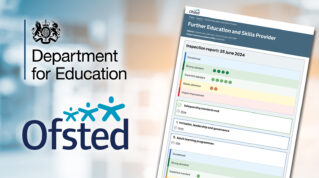Ofsted has pledged to move away from a “one-size-fits-all” approach and reform its inspection framework to “better tailor” inspections to the diverse training delivered by FE and skills providers.
The watchdog has also vowed to replace single-phrase judgments for overall effectiveness with a “report card” that will be customised to different types of further education provision, not just classroom-based teaching.
The commitments were announced today as part of Ofsted’s response to its “Big Listen” consultation, which was launched earlier this year after the ruling from a coroner that an inspection contributed to the death of headteacher Ruth Perry.
It comes after education secretary Bridget Phillipson announced yesterday that headline Ofsted grades would be scrapped for schools with immediate effect, a move which will “follow” in other sectors, ahead of the introduction of new report cards in 2025.
Adapted approach to FE and skills
Sir Martyn Oliver, who replaced Amanda Spielman as chief inspector in January 2024, said Ofsted will “reset our relationship with those we regulate and inspect, working collaboratively with them to put children and learners first”.
The watchdog revealed today that it will consult “later this academic year” on creating a reformed inspection framework for schools, early years and FE and skills.
The Big Listen response said a “common frustration” that Ofsted heard was that “we took a one-size-fits-all approach to our FE and skills inspections” and that the system of inspection “does not always feel as applicable to independent specialist colleges, apprenticeship training and adult learning as it does to courses for 16- to 18-year-olds”.
Ofsted said it now recognises “we need to better adapt our approach to a diverse FE and skills sector”.
“This is why we will consult on reforming the inspection framework for FE and skills to better tailor our inspections to the diverse range of provision in the sector. This means the framework needs to work as well for classroom-focused qualifications as it does for employer-led vocational and technical training.”
Oliver told FE Week: “I’ve heard loud and clear that people are wanting to see their individual context and nuance coming through. A childminder isn’t a primary, which isn’t a secondary, which isn’t a post-16 further education provider. Each of them has their own individual aspects.
“People want to see the nuance, they want to see the complexity, they want to recognise that their setting is being reported on, not that we’ve got a simple framework across all of them, which is denying that complexity in which they’re working in.”
He added: “Looking at, for example, a small training provider versus a massive FE college and how we can make sure that we’re addressing what it’s like and not subjecting them to one framework, which is perhaps trying to make them exactly comparable when they’re clearly not. They’re two very different types of institutions and we heard a desire to see us report that nuance back to them.
“I think that’s a part of the stress and anxiety that people have felt from our work. Addressing that will be crucial.”
Report cards will also be ‘tailored’
It is likely that the current system of single-phrase headline judgments will stay in place for FE providers until Labour’s proposed “report cards” are launched in September 2025.
Asked why Ofsted has not removed single headline grades for providers other than schools at this time, Oliver told FE Week: “That was the request [from the education secretary] and that’s what we were capable of doing.
“We’ve worked flat out over the summer in order to deliver this for schools. To do so for the other sectors was beyond our ability at this stage because there’re more complications in the systems, so we simply couldn’t do early years, schools and FE and skills all at once.”
Oliver did however say that the proposed report cards, which will have a “sharper focus on outcomes”, will be adapted to the different context providers work in.
Ofsted will consult on the report cards “later this academic year”, and said in today’s response they will be “better tailored to different types of FE and skills provision”.
The watchdog will also “consider how our inspections focus on how providers remove the barriers to opportunity for learners from disadvantaged backgrounds and those with SEND”, adding that in the meantime, the inspectorate will “clarify how we will apply personal development and behaviour judgments from September 2024”.
A new “area insights service” will also visualise local area data and enable inspectors to “better understand local context”.















Your thoughts